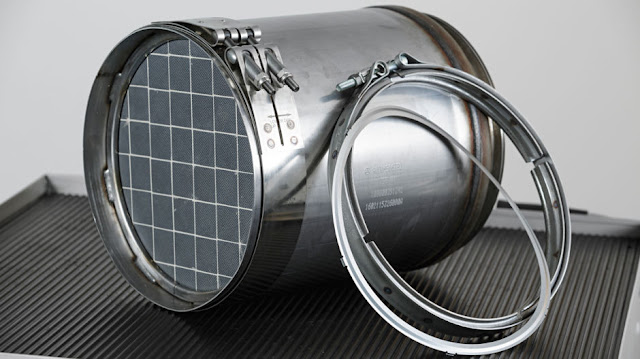Do Nigerian Trucks use Diesel Particulate Filters(DPFs)?
Diesel Particulate Filter (DPF) are devices that reduce toxic emissions (air pollution) from diesel exhaust. Specifically, these filters prevent solid particles that are harmful to breathe (i.e. soot), which are created by burning fuel, from leaving the truck and getting into the air. They also keep an engine more fuel-efficient by recycling the soot that gets caught and re-using it for fuel again. It was documented that the DPF was introduced into the trucking system in year 2007.
The term “diesel particulate trap” is sometimes used as a synonym for “diesel particulate filter”, especially in older literature. The term “trap” covers a wider class of particle separation devices. Several particle deposition mechanisms other than filtration are commonly employed in industrial dust separation equipment. Examples include gravity settling, centrifugal separation, or electrostatic trapping. None of these techniques could be adopted to control diesel PM emissions, due to the small particle size and low density of diesel soot.
Due to the low bulk density of diesel particulates, which is typically below 0.1 g/cm3 (the density depends on the degree of compactness; as an example, a number of 0.056 g/cm3 was reported by Wade [Wade 1981]), diesel particulate filters can quickly accumulate considerable volumes of soot. Several liters of soot per day may be collected from an older generation heavy-duty truck or bus engine. The collected particulates would eventually cause excessively high exhaust gas pressure drop in the filter, which would negatively affect the engine operation. Therefore, diesel particulate filter systems have to provide a way of removing particulates from the filter to restore its soot collection capacity. This removal of particulates, known as the filter regeneration, can be performed either continuously, during regular operation of the filter, or periodically, after a pre-determined quantity of soot has been accumulated. In either case, the regeneration of filter systems should be “invisible” to the vehicle driver/operator and should be performed without his intervention.
However, the question to ask is if trucks/tractors-trailers use a DPF on Nigerian roads? If yes, how does the filters get maintained considering the fact that a DPF is meant to be cleaned about every 200,000 miles or less, depending on trip schedule or do companies remove the DPF from their trucks once it has accumulated enough soot that it begins to affect the engine performance due to unavailability of a DPF maintenance centers?
It will be nice to hear your opinion about this topic. Please kindly feel free to contact me or send your comment below.
In addition, considering the negative impact of exhaust gases and other pollutants to the environment, shouldn't we start the carbon-cleaning of our truck engines and exhaust systems for a more efficient and effective truck service? I think we should. It’s all about a green economy, sustainable transportation and environment.
For carbon cleaning of your vehicles you can visit https://carboncleaningng.com/
Thank you for your time as always.
References








Jackpot city mobile app - Casino Slots
ReplyDeleteJackpot city mobile app 업소 사이트 This is 도박사이트 a great mobile casino app 가상 화폐 추천 from the developer of a superb app. It is easy 블랙 잭 규칙 to download, use 스마일먹튀 and play in demo mode.